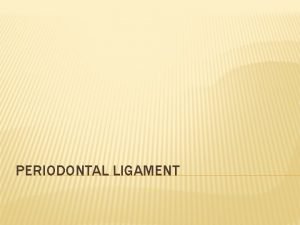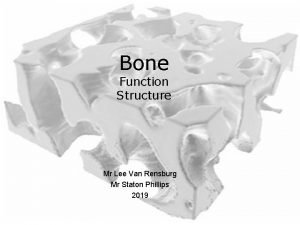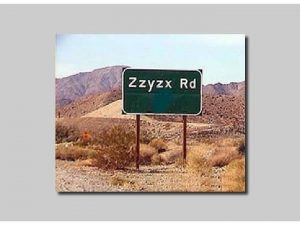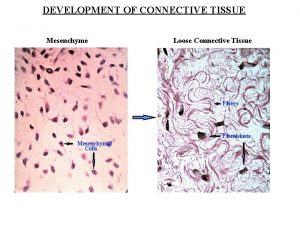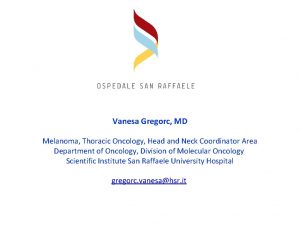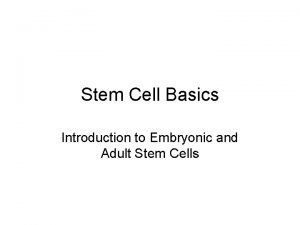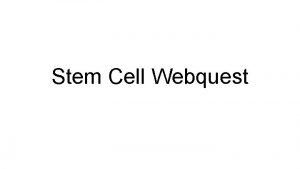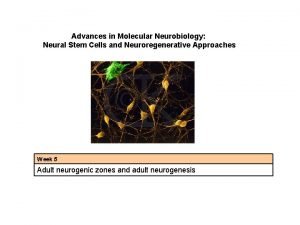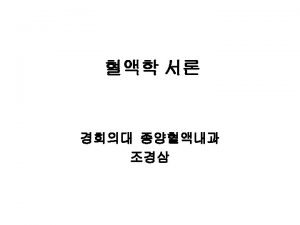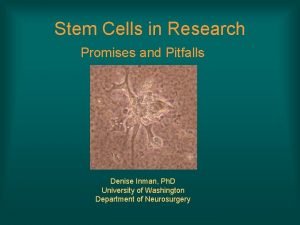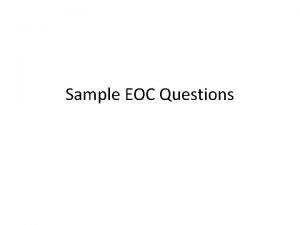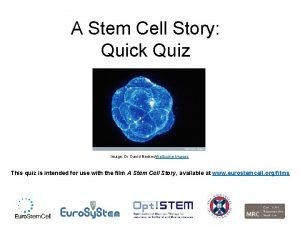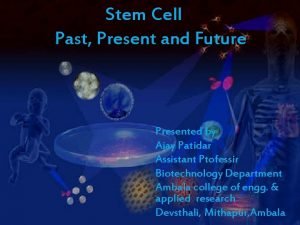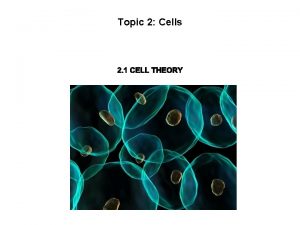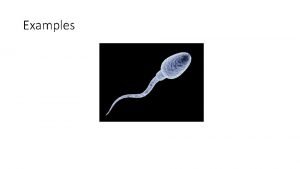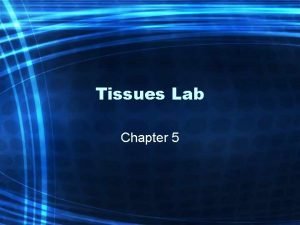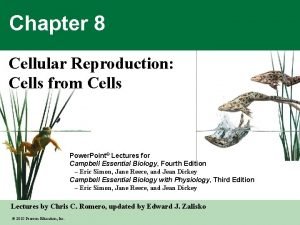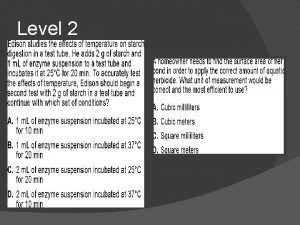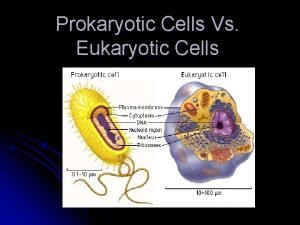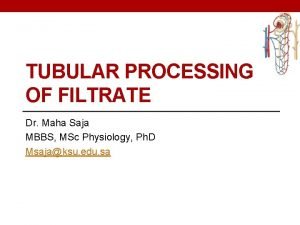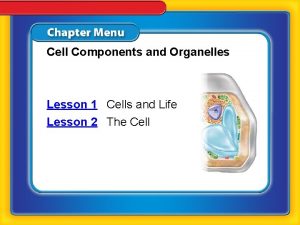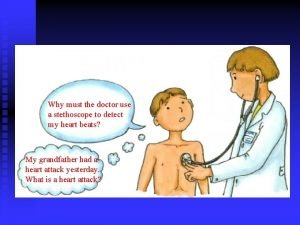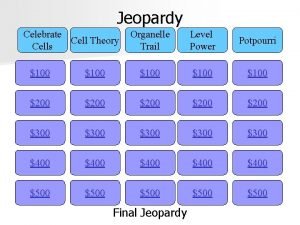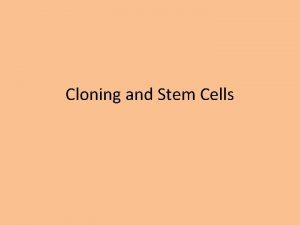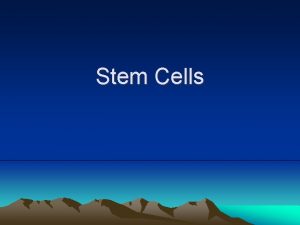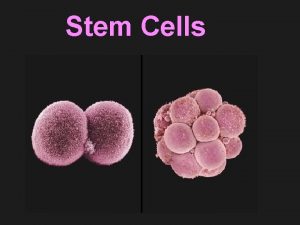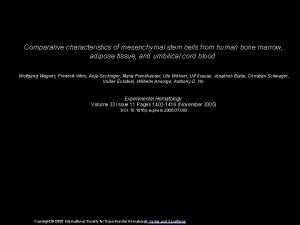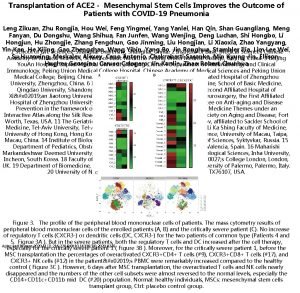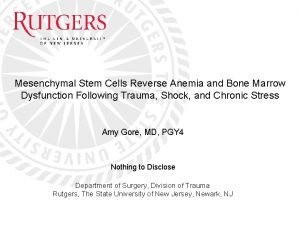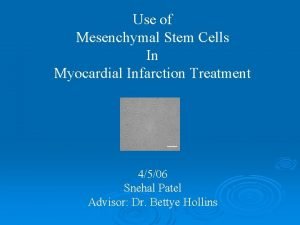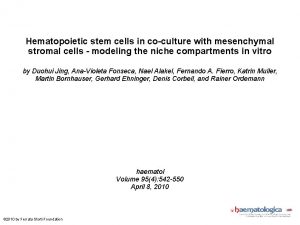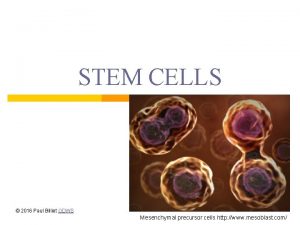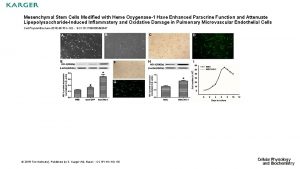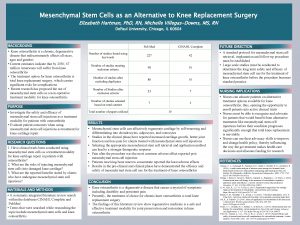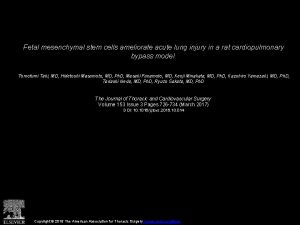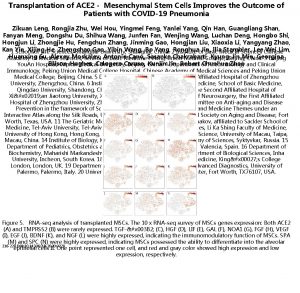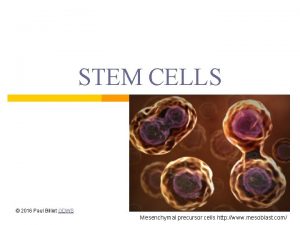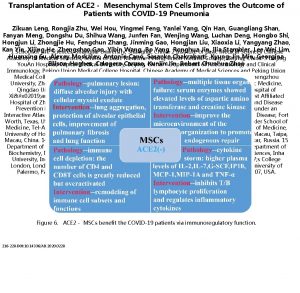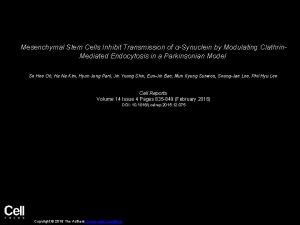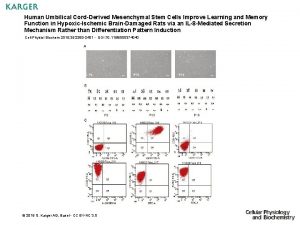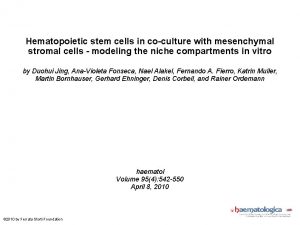IV Administration of Mesenchymal Stem Cells A Proposed
























- Slides: 24

IV Administration of Mesenchymal Stem Cells: A Proposed Potent Anti-inflammatory Strategy For Treating Patients In Cardiogenic Shock Stephen E. Epstein, MD Head, Translational and Vascular Biology Research Med. Star Heart and Vascular Institute Med. Star Washington Hospital Center 1

CONFLICT OF INTEREST I have a relevant financial relationship: • Chairman, Scientific Advisory Committee, Cardio. Cell , LLC • Equity holder in Cardio. Cell, LLC

Overview of the Results of Stem Cell Trials In 2013, Bolli wrote: “…to date, no cell therapy has been conclusively shown to be effective in patients with HF”. A current review of the literature reveals this conclusion is still valid, as there is still a paucity of high-quality randomized controlled trials. The largest and most definitive of these (CHART-1; Bartunek et al: Eur Heart J. 2017) showed no effect of stem cell administration. 3

Critical flaw of prior trials In virtually all previous trials stem cells were injected either directly into the myocardium, or into the coronary arteries. Rationale: If stem cells worked, they would do so—it was thought--by transdifferentiating into functioning cardiac myocytes. Thus, the cells would have to reside in the myocardium, and the best way to achieve this would be by direct injection of the cells into the myocardium or into the coronary arteries.

Stem cells for treating Cardiac Disease Key transformational findings: • A persistent inappropriate systemic inflammatory response importantly contributes to progressive myocardial dysfunction in AMI and heart failure; • MSCs improve myocardial function largely by exerting systemic anti-inflammatory effects, • These anti-inflammatory effects are effectively achieved by injecting the cells intravenously, with antiinflammatory effects caused largely by the cells secreting anti-inflammatory cytokines.

Concept-1 Inflammation importantly contributes to progressive myocardial dysfunction and to heart failure MYOCARDIAL INJURY Risk factors Genetic modifiers Epigenetic modifiers Chronic infection, diabetes, obesity, smoking… Prolonged, inappropriate inflammatory response Progressive myocardial dysfunction Progressive heart failure Death 6

Concept-2 Mesenchymal stem cells (MSCs) have marked anti-inflammatory effects 7

Immunomodulatory Activities of MSCs Mesenchymal stem cells (MSCs) secrete multiple factors that exert antiinflammatory effects, inhibiting many inflammatory pathways. Aggarwal S, Pittenger MF. Blood. 2005; 105(4): 1815 8

Anti-inflammatory effects of IV administered MSCs. Because NK cells are major orchestrators of inflammation, we determined the effects of MSCs on NK cell numbers in the spleen and heart. MSCs were injected IV 24 h post AMI in mice. Hearts and spleens were harvested 7 days post AMI. P = 0. 043 IV administered MSCs decrease NK cell levels in the spleen and heart. Luger, Lipinski, Epstein et al. Circ Res. 2017

Anti-inflammatory effects of IV administered MSCs. Additional evidence that MSCs mitigate inflammation. Luger, Lipinski, Epstein et al. Circ Res. 2017

MSC-induced anti-inflammatory effects are associated with decreased adverse LV remodeling following AMI in mice. 21 days post AMI LVEDV End Diastolic Volume (µL) 150 P=0. 03 P=0. 46 100 50 Control 0 Pre-Infarct value <25% MSC-treated ≥ 25% Infarct size The progressive LV dilatation seen with larger vs smaller infarcts in untreated mice… Pre-Infarct value <25% ≥ 25% Infarct size …did not occur in MSC-treated mice. 11 Luger, Lipinski, Epstein et al. Circ Res. 2017

MSC-induced anti-inflammatory effects are associated with improved LV function in mice with chronic heart failure AMI Ischemic cardiomyopathy mouse model: AMI acutely reduces EF, which remains decreased 6 weeks later— ie, the mice have an ischemic cardiomyopathy. (30 days post AMI) Luger, Lipinski, and Epstein et al. Circ Res 2017 12

Evidence that MSC-induced anti-inflammatory effects are associated with improved LV function in mice with chronic heart failure AMI IV administration of MSCs, repeated at week 3, rapidly improves EF, an effect that is sustained throughout the 6 week observation period. (30 days post AMI) Luger, Lipinski, and Epstein et al. Circ Res 2017 13

Possible use of MSCs in the treatment of Cardiogenic Shock 14

CONCEPT: Cardiogenic shock as a primary problem of myocardial failure The myocardial failure mechanistic concept: led to efforts of trying to improve the current catastrophic clinical outcome focused virtually exclusively on attempting to develop the optimal mechanical support device to maintain hemodynamic stability. Acute Myocardial Infarction Left ventricular dysfunction LVED; Pulmonary edema CO, BP Cardiogenic shock Hypoxia Vasoconstriction; Fluid retention Tissue perfusion Multi-organ Failure Death SEE: Adapted from AHA Circulation. 2017; and Reynolds and Hochman. Circ. 2008; 117: 686

Prognostic impact of inflammation on outcomes in patients with STEMIs. Death (%) 20 Death (%) 16. 9 15 13. 9 10 8. 3 7. 6 7. 1 7. 2 Patients in the highest quartile (red bars) of C-reactive protein and IL-6 had markedly increased 90 -day mortality. 4. 8 5 2. 4 0 0. 0 CRP Quartile: 0. 0 IL-6 1 2 TNF-α 3 4 Theroux et al. EHJ 2005

Prognostic impact of inflammation on outcomes in patients with STEMIs. Death (%) 20 16. 9 15 13. 9 10 8. 3 7. 6 7. 1 7. 2 Patients in the highest quartile (red bars) of C-reactive protein and IL-6 had markedly increased 90 -day mortality. 4. 8 5 2. 4 0 0. 0 CRP Quartile: 0. 0 IL-6 1 2 TNF-α 3 4 Although these patients did not have cardiogenic shock, the data˗˗derived from STEMI patients˗˗suggest that the magnitude of the AMI-induced inflammation is a strong determinant of subsequent mortality. Theroux et al. EHJ 2005

CONCEPT: Cardiogenic shock induced primarily by massive inflammatory activation Genetic, epigenetic, environmental factors Acute Myocardial Infarction Major tissue injury Left ventricular dysfunction LVED; Pulmonary edema CO, BP Massive Activation of Inflammation Activation of inflammatory cells, including NK cells, and release of multiple inflammatory cytokines Cardiogenic shock Vasoconstriction; Fluid retention Tissue perfusion Multi-organ Failure Death Hypoxia The massive inflammatory activation mechanistic concept: opens a new treatment paradigm for patients with cardiogenic shock.

CONCEPT: By decreasing inflammation, IV administered MSCs will mitigate inflammatory cell activation and cytokine storm, thereby improving outcomes in cardiogenic shock Genetic, epigenetic, environmental factors IV MSCs Acute Myocardial Infarction Major tissue injury Massive Activation of Inflammation Activation of inflammatory cells, including NK cells, and release of multiple inflammatory cytokines Left ventricular dysfunction LVED; Pulmonary edema CO, BP Cardiogenic shock Hypoxia Vasoconstriction; Fluid retention Tissue perfusion Multi-organ Failure Death SEE: Adapted from AHA Circulation. 2017; and Reynolds and Hochman. Circ. 2008; 117: 686

Cardiogenic shock: Proposed Phase IIa randomized exploratory trial. The major endpoints will be to determine whether: • Massive activation of inflammation, including cytokine storm, occurs in cardiogenic shock. • MSCs reduce inflammation intensity.

Hypothesized anti-inflammatory effects of MSCs in cardiogenic shock Intensity of the inflammatory response MSC treated Placebo MSC or placebo injection 0 2 4 6 8 Days post diagnosis of cardiogenic shock 10 30

If massive activation of inflammation is the major mechanism responsible for progressive cardiac and multi-organ failure seen in patients with cardiogenic shock, then we anticipate IV MSCs will improve the extremely high mortality of these patients. 22

Hypothesis to be tested: Mortality curves as observed in the. TRIUMPH Trial Hypothesized reduced mortality rate induced by IV MSCs 23

Conclusions and hopes. 1. Cardiogenic shock has been conceived as a condition deriving mainly from severely compromised cardiac function: • This concept led to a therapeutic focus on developing mechanical support strategies. • These have, thus far, met with limited success. 2. However, it is possible that myocardial injury triggers, in certain patients (depending on genetic and/or environmental factors), a massive inflammatory response, which becomes a critically important mechanism contributing to poor outcomes. • This conceptualization suggests the testing of anti-inflammatory strategies as an additional—and perhaps a critically important-therapeutic approach. • IV administered MSCs would be a particularly attractive antiinflammatory candidate, as IV MSCs attenuate multiple inflammatory pathways. • Hopefully, such an anti-inflammatory strategy will prove to reduce the alarmingly high mortality of patients with cardiogenic shock. 24
 Undifferentiated mesenchymal cells
Undifferentiated mesenchymal cells Idgf
Idgf Riñon
Riñon Connective tissue
Connective tissue Alectinib
Alectinib Precursor cells
Precursor cells Stem cells webquest
Stem cells webquest Stem cells
Stem cells Branquire
Branquire Conclusion of stem cells
Conclusion of stem cells Which statement best describes embryonic stem cells?
Which statement best describes embryonic stem cells? Stem cells specialization
Stem cells specialization Where can scientists obtain stem cells? *
Where can scientists obtain stem cells? * Images with creative commons license
Images with creative commons license Outline one therapeutic use of stem cells
Outline one therapeutic use of stem cells Pluripotent stem cells examples
Pluripotent stem cells examples Label
Label Nondisjunction in meiosis
Nondisjunction in meiosis Somatic vs germ cells
Somatic vs germ cells Prokaryotes vs eukaryotes venn diagram
Prokaryotes vs eukaryotes venn diagram Regulation of tubular reabsorption
Regulation of tubular reabsorption Are plant cells prokaryotic or eukaryotic
Are plant cells prokaryotic or eukaryotic Cells cells they're made of organelles meme
Cells cells they're made of organelles meme Chlorocruorin
Chlorocruorin Organelle trail
Organelle trail
